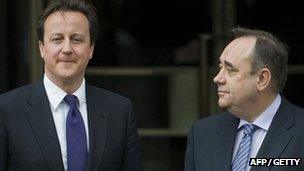Scottish independence: TV debate row continues
- Published

David Cameron (left) had been challenged to a TV debate by Alex Salmond
Scotland's first minister has called on David Cameron to reconsider his decision not to face him in a televised debate on Scottish independence.
The UK prime minister last week rejected Alex Salmond's call for a head-to-head showdown.
He said Mr Salmond should instead debate with Alistair Darling, the head of the Better Together campaign.
Mr Salmond has now accused Mr Cameron of "seeking power without responsibility".
In a letter written to the first minister last week, Mr Cameron agreed there should be television debates ahead of the referendum, which will be held on 18 September 2014 with voters being asked the straight yes/no question: "Should Scotland be an independent country?"
Mr Cameron said Mr Darling, the former Chancellor, had been asked by all of the pro-UK parties in Scotland to lead the No campaign.
The prime minister wrote: "It is a well understood and reasonable principle that you get to pick your own team's captain, but not your opponent's as well."
He also said: "It is time for the two campaigns and the broadcasters to meet and start working to make these debates happen."
Mr Salmond revealed on Sunday that he had written to Mr Cameron setting out "six reasons why a constitutional debate must now take place between the two heads of government".
The first minister's letter read: "With respect, your arguments for not debating Scotland's future are undermined by the highly political nature of your letter.
"You are attempting to place yourself in the position of trying to dictate the terms of the debate on Scotland's future without being willing to publicly defend your arguments in debate. You seek power without responsibility and that is unacceptable".
Mr Salmond said Mr Cameron's government was "central to the entire referendum debate from the perspective of the No campaign", and said voters had the right to know the details of the prime minister's alternative constitutional arrangements to independence.
Defence arrangements
He also said there were many questions which Mr Darling, the former Chancellor, could not answer, such as why the UK government was not sitting down to negotiate with the Scottish government over issues such as sterling or defence arrangements.
Mr Salmond's letter concluded: "Following the SNP's majority victory in the last Scottish Parliament election, you made the following comment: "I will campaign to keep our United Kingdom together with every single fibre that I have." (Daily Telegraph May 7, 2011) You continue to direct your Government, and its taxpayer-funded resources, to make the case against an independent Scotland.
"That is entirely consistent with your stated intention in the quote above. However your attempt to duck a television debate on the subject is not. Either you stand up and debate or butt out of the debate for good.
"The case for a head-to-head debate between us is unanswerable. You should reconsider."
Speaking on the BBC's Andrew Marr Show on Sunday, Mr Cameron once again against dismissed suggestions that he should take part in a televised debate with Mr Salmond.
He said: "Alex Salmond wants the question to be about anything other than the question.
"So he would like the debate to be the SNP versus the Tory Party or Scotland versus England. It's not - it's a debate between Scots.
"What it should be is between Alistair Darling, leader of the No campaign, and Alex Salmond, leader of the Yes campaign.
"Let them debate. But he wants to change the question. He's a canny guy but I saw that one coming."